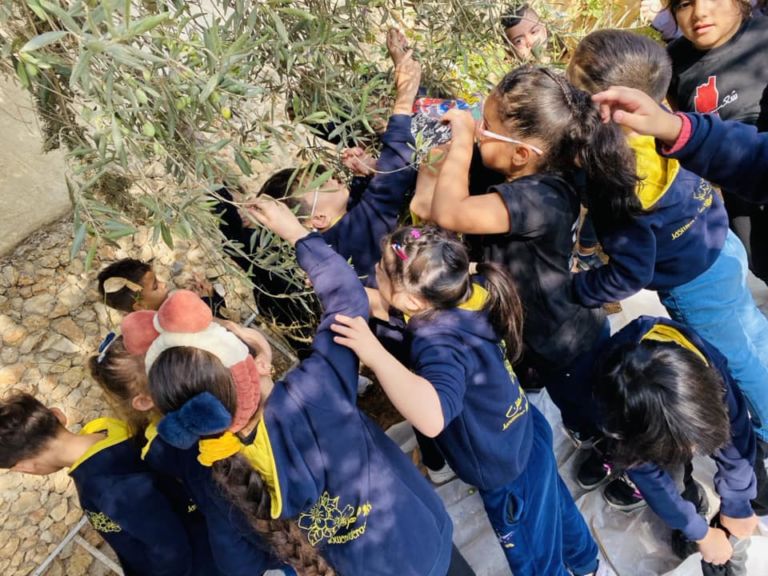
Lajee's Zahrat Al-Yasmeen Kindergarten
Celebrates Palestinian Heritage through Cultural and Environmental Education
During the month of October, the children at Zahrat al-Yasmeen kindergarten, a unit of Lajee Center, participated in many activities that emphasized their Palestinian heritage and their rootedness in the land of Palestine. The children experienced for themselves the process of harvesting olives and seeing how olives are processed for oil and for pickling. They traveled to the Cremisan Monastery to learn about the changing seasons by playing amidst many kinds of trees, touching the leaves and feeling the cool autumn wind. They heard stories from their elders and dressed in traditional Palestinian clothing to learn about their history. The kindergarten teachers believe in teaching through experience – creating possibilities for the children to learn by doing and having experiences they will remember.
Palestinian heritage day – October 10, 2022
On October 10, Zahrat al-Yasmeen celebrated Palestinian heritage day with both kindergarten classes. The children came dressed in traditional Palestinian clothing – such as embroidered thobes, keffiyehs, and kaftans. The children brought traditional foods to eat together – such as zaatar, olive oil, lebneh and taboun. They learned about Palestinian cultural items such as traditional coffee servers and musical instruments. They sang traditional songs together and practiced the Palestinian dance of dabke.
Olive harvesting – October 22 – 26, 2022
The olive harvest is a sacred tradition in Palestine. Palestinians have harvested their olive trees and honored its fruit for generations. Children in Aida have heard stories from their grandparents about harvesting olives on their land before the Nakba – the catastrophe in 1948 when Palestinians were forced out of their homes and villages and became refugees. They have also heard stories of previous generations getting paid by landowners to harvest the massive olive groves on the northwest side of the camp. However, access to these groves was completely severed by Israel’s construction of the apartheid wall immediately along the edge of the camp, leaving no remaining green space for children to play near the camp.
In 2007, Lajee Center began to revitalize the area surrounding the center, including creating a large garden and installing a soccer field. The area, which had been neglected for years, included several olive trees, which the staff of the center began tending. With years of careful attention and annual pruning, the trees have begun to bear good fruit. The beautiful garden therefore served as a perfect place to teach the children of Zahrat al-Yasmeen about their heritage and the significance of olives and olive trees in Palestinian culture. As they picked the ripe olives, the children learned traditional Palestinian songs that are sung during olive picking. A few days after the harvest, they participated in crushing the olives with stones to prepare for pickling. They learned that the olives are crushed to make the taste less bitter for eating, and they put the olives in water for two days. After the olives had soaked, a few of the children’s grandmothers came to each class to help them prepare the olives for pickling. They prepared the olives in a large jar with lemon, pepper, and salt.
Visit to Cremisan – October 23, 2022
One of Lajee Center’s core activities is environmental outreach through its Health and Environment Unit. Continuing this core mission with the Center’s youngest participants, Zahrat al-Yasmeen took a day trip to the land of the Cremisan Monastery to teach the children about the environment in Palestine. The land of Cremisan sits at the top of Beit Jala and is filled with many different kinds of trees. The visit focused on teaching the children about the change in season from summer to fall and winter. The children saw the different colors of the leaves, felt their crisp dryness, and heard the crunch beneath their feet. They felt the cool wind that marks the changing weather and they picked up pinecones and acorns. They saw that the grapes and the figs had been harvested and their leaves started to turn colors. These experiences are difficult for the children to find inside the crowded camp, although many families do have rooftop gardens and preserve their heritage of growing grapes and figs. Zahrat al-Yasmeen director Maggie reflected that “the kids really enjoyed it. The next day they were excited to tell the story about Cremisan.” The aim of the trip is for the children to learn to appreciate the beauty of all seasons and to appreciate the environment. Both children and teachers had a lot of fun. Maggie says “if the children live the experience, they will never forget it.” Focusing on giving the children experiences that they will remember and learn from is a core mission of the kindergarten.

